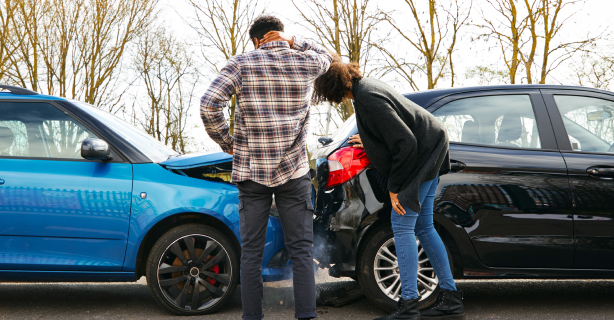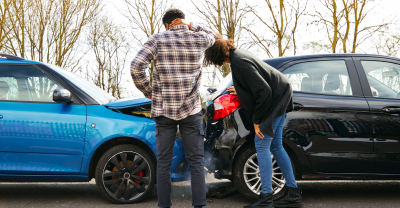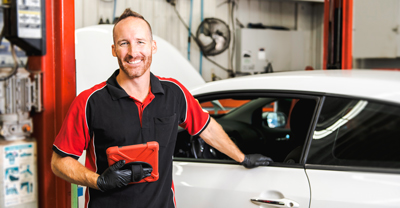What to do after a car accident


0 min. read
Getting into a car accident can be overwhelming. In the minutes after a crash, it’s easy to miss key steps that protect your safety—and help the insurance claim process later. Use this guide to help you know what to do after a car accident.

Start your free auto insurance quote today.
1. Stop your vehicle
If you get into an accident, stop your car and—if possible—leave it where it came to a stop. Don't leave the scene. If you have to move drivable vehicles to avoid traffic issues, be sure to look closely at where they are and, if possible, take photos of their location on the road, as well as impact damage before moving them to a safe, nearby location.
2. Check for injuries
To check for injuries and stay safe after an accident, take a moment to assess the situation from inside your vehicle, if you’re able.
Check whether everyone involved appears okay. If someone needs urgent medical attention, call 911 right away and stay on the line until the dispatcher says it’s okay to hang up.
Even if you feel okay, consider seeking medical attention after the accident. Some injuries may not be immediately noticeable, and a doctor’s visit can also help with documentation.
3. Contact the police
Report the accident to the police and get further instructions. It’s important to reach out to the authorities, among other reasons, so that there is an official, neutral record of the accident. Police can also help with things like traffic control and coordinating medical services. In some areas it is legally required to report an accident when there’s an injury, death, or damage above a certain level.
If nobody's hurt, make sure you're calling a non-emergency number. This alternative number can vary depending on your location. It’s often listed on the city or police department website.
4. Don’t admit fault
Avoid discussing what happened with other parties involved in the accident. Every detail, opinion, and fact could play a role in determining the outcome of recouping damages or any further legal implications.
When talking to the police, cooperate fully by answering questions and providing your name, driver’s license, and insurance details if requested. When talking about the accident itself, stick to the facts, such as the time and location of the event. Avoid giving opinions, speculating about what might have happened, or assigning blame. If you aren’t sure of a detail, it’s okay to say so.
5. Gather details
If it’s safe to do so, gather key information like the other driver’s name, contact details, and insurance company and policy number.
It can also be helpful to take photos of:
Damage to all vehicles
License plate numbers
Any other damaged property
The accident scene, including any debris in the roadway
If there are street signs nearby, write down the street names or take a photo showing the street signs and your location.
6. Contact your insurance company
Report the accident and get instructions for resolving any claims for damages you may have sustained. Your insurance company will help you understand how to file a claim and navigate the process.

How your insurance provider helps after an accident
Insurance can help you recoup damages you sustained in an accident. It can also help protect you from damages others might seek from you as a result of a crash. That's an important point—especially when determining who's at fault. That's why you should contact your insurance provider and let them help you.
Depending on the coverage you carry, here are five other ways your insurance provider can help:
Towing your vehicle
Assessing your vehicle damage
Negotiating a reasonable repair cost for your vehicle
Managing the disposal of your car if it's a total loss
Providing assistance if another party is seeking recovery of damages from you by resolving those claims, and possibly even paying for an attorney to assist in defending a lawsuit filed against you
That's valuable assistance and expertise you may need when you least expect it.
Frequently Asked Questions (FAQs)
Will an auto accident increase insurance rates?
Not every accident will affect your insurance rate. If there is a rate increase, the amount can vary based on the company (provider or carrier) you have your insurance with.
A number of factors can also impact rates, including the amount of damage resulting from the accident and your level of fault for those damages. Additional factors could also include any driving violations associated with the incident and your prior driving history.
What documents should be kept in your vehicle?
It’s a good idea to keep the following in your vehicle at all times:
Proof of insurance
Vehicle registration
Emergency contact numbers
Medical information (conditions, allergies, and medications)
Vehicle owner’s manual
How do you deal with aggressive or uncooperative drivers after an accident?
If the other driver is angry, refusing to cooperate, or acting threatening, it’s important to prioritize your safety over gathering information. Stay calm and keep your distance. If you can, stay in your car with the windows up and the doors locked while you call the police.
If they leave the scene, try to get the plate number, vehicle description, and direction of travel, then share those details with law enforcement.

The general information in this blog is for informational or entertainment purposes only. View our blog disclaimer.










